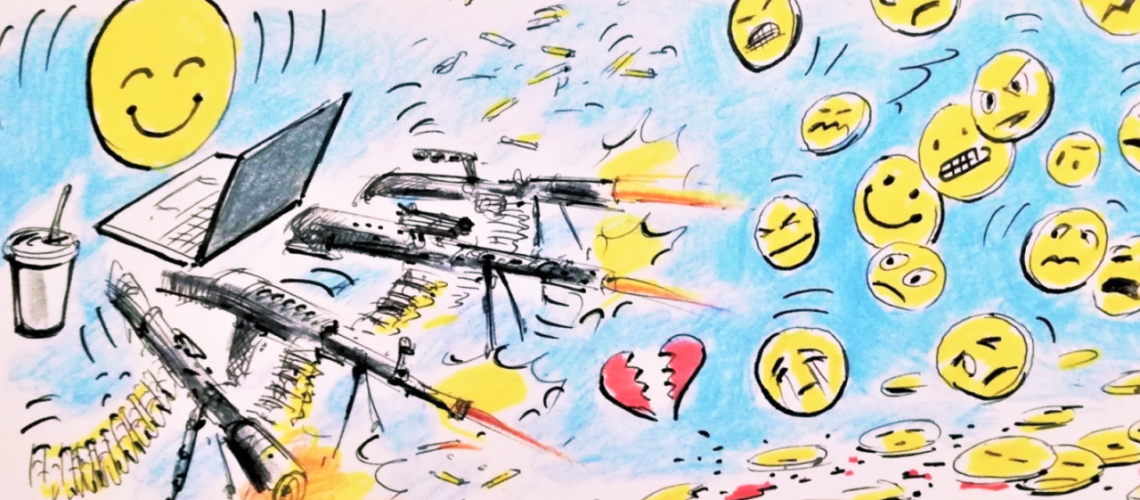Every human being a potential publisher now and thanks to their smartphones, social media is an influential agent of change in the global public sphere. It’s basically for the people, through the people and by the people now, thanks to social media. Despite its great potential, the digital town square is also responsible for growing unwanted phenomena, such as influencer vigilantism, fake news, and digital defamation and so on.
The Misuse of Freedom of Expression:
The right to express one’s opinions freely is the essence of democracy. It is you who has to use your freedom responsibly and respect others’ freedom. Some social media influencers and content creators are now taking advantage of this freedom. They are abusing this freedom by engaging in online vigilantism by accusing, shaming, or attacking people and institutions without due process. Like this, some journalists, who were earlier guided by editorial integrity, now have begun pandering to sensationalism and political bias to catch clicks, mostly, lies.
Social media is buzzing with defamation of all sorts. People are named and shamed for anything and everything. When nothing more than a personal vendetta, we cloak our actions in a language of “exposure” or “justice.” It ends up doing no good for a more informed society. Rather, it erodes public trust and causes incalculable damage to the reputation and mental health of the targets.
Influencer Vigilantism – A Disturbing Trend :
The unchecked rise of vigilantism under the guise of being an influencer is a phenomenon that promises greater harm than good. Some content creators upload videos tackling alleged wrongdoers, spreading unverified information, or delivering “justice” to millions of followers. They may say they are doing it for a good cause, but not following due process and fact-checking makes that dangerous.
This creates an alternative justice system that is based on public opinion and social media as opposed to law. This can result in a number of damaging consequences, including mob harassment and reputational damage; and while it may not happen inside a courtroom, it is definite that these things occur.
Fake News: Vitality over Veracity:
Social media is all about vitality and not veracity! Whether it’s propaganda for a political cause, doctored videos, or content designed to illicit rage, fake news travels fast and shapes opinion before the truth can catch up. There are many repercussions like social tension, political polarisation and economic manipulation.
When content is unaccountable, we are left with the loudest and most shocking. When no fact checks or clear guidelines to moderate the platform exist, lies get priority.
The Case for Regulation and Ground Rules:
In light of this, one may ask whether any social media should go unchecked, in the name of free speech? Or is it time to draw some ground rules that allow a balance between freedom and responsibility?
The answer lies in the middle. Hate speech and call-to-violence aren’t free speech, and similarly, expression that is defamatory, misleading, and harassing should not be allowed online.
What kind of regulations can help?
- Clear Content Moderation Policies. – Platforms must be clear on what qualify as misinformation, hate speech, defamation and targeted harassment and application should be consistent!
- Legal Accountability for Influencers and Journalists. – It is essential for social media influencers and digital journalists to adhere to basic ethics and law. Anyone who publicly accuses, makes money from defamation, or gives false narratives should have the same legal consequences as the press.
- Digital Literacy and Fact-Checking. – If proper digital literacy is given to the users, and platforms urge integrating verified fact-checking tools, then it can help in quelling misinformation.
- Independent Grievance Redressal Mechanisms. – A strong grievance redressal system for victims of online defamation and misinformation can provide relief and remedy in real time without lengthy legal processes.
- Mandatory Disclosure of Sponsored or Motivated Content. – Content with political or commercial motives must have disclaimers. Influencers ought to be transparent regarding paid collaborations or biased coverage.
Conclusion :
Social media is not above the law nor should it be. It is a space that must be nurtured, not neglected. The goal is not censorship, but accountability. Although commentators, journalists, and common users should accept free speech, it should not be a license for fooling around.
It can transform from a tool of empowerment to a weapon of chaos without norms. All stakeholders, governments, platforms, creators and civil society have to come together and build up a digital ecosystem that rests on a foundation of truth, fairness and responsibility.



